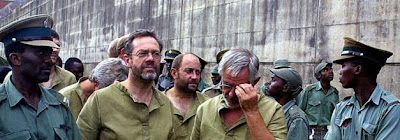The first I heard of the detention in Zimbabwe of an American plane packed full of mercenaries was on Monday 8 March 2004. We foreign correspondents in Johannesburg had no idea if the story was true, and at first excited rumors suggested the hired guns had tried a coup in Zimbabwe itself. Gradually the evidence of a plot in Equatorial Guinea emerged…
That’s journalist Adam Roberts writing in The Wonga Coup. The details that leaked out over the following months became more and more salacious. All are investigated and recounted in Robert’s surprisingly excellent book.
The West African micro-state of Equatorial Guinea is a mess, even by regional standards—the personal fiefdom first of Macias Nguema followed by son nephew Obiang, both inept, corrupt, and paranoid leaders with a mile-long trail of dead opponents (and innocents).
A coup, according to many, would be an act of mercy for the country. But not this coup. It was a bald grab for oil money by a cabal of white mercenaries hoping to rule the country through a native stooge.
It’s an incredible cast of characters: white South African mercenaries, a former priest turned President-in-waiting, Lebanese businessmen, British aristocrats, bush pilots, Spanish intelligence agents, American oil executives, Zimbabwean arms dealers, Congolese rebels, a venerable US bank, a Ukrainian chemical weapons merchant, and even Margaret Thatcher’s hapless son.
(What is it with the sons of right wing European premiers and dirty African tricks? Is it some sort of club?)
Sound like fiction? Perhaps because art imitates life in Equatorial Guinea, not the other way around. Airport spy novelist Frederick Forsyth based his famous Dogs of War on a previous (failed) coup in EG, based on a suspiciously intimate view of the plot itself. One of the pleasures of Roberts’ Wonga Coup is his digging up of new evidence suggesting Forsyth was one of the actual plotters. And Lord Jeffrey Archer, another famous writer of spy story pulp, seems to have had a hand in the 2004 plot.
If you haven’t read it, the perfect accompaniment to The Wonga Coup is Tropical Gangsters—a development consultant’s tale of two years in Equatorial Guinea’s government.
Robert Klitgaard was a Harvard Kennedy School prof who wanted out of academe for a spell in the field. Don’t picture a gray-haired dope in tweed. He’s a surfing, late-night guitar-jamming hipster. In Klitgaard’s memoir, Obiang’s government gets a slightly more sympathetic hearing, but the corruption and ineffectiveness are still on display.
One of things I like most about Klitgaard’s book: you’re never quite sure who the tropical gangsters really are. Obiang and his cronies? American business execs? Or the whirlwind of World Bank and IMF consultants themselves?


2 Responses
It’s not only the sons of right wing European premiers, you can count also Jean-Christophe Mitterrand, the son of the former socialist french president :-)
But of course in France, it’s a kind of national specialty, so it’s easier to see even socialists doing it :-(
Quick notes:
Obiang is Nguema’s nephew, not son.
Obiang is corrupt, inept and paranoid but Nguema was all that and CRAZY.
Obiang’s coup was an improvement.